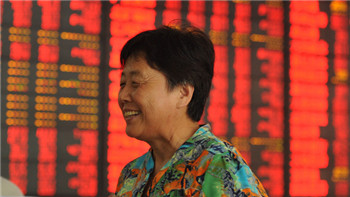
We’ve told Sid, sought average Joes from Bloggs to Sixpack, and followed the investing adventures of Mrs Watanabe around the world. Archetypal retail investors serve the same purpose for market observers as pollsters’ voter stereotypes for politicians. So meet Mrs Wong, China’s contribution to the genre and the force behind its stock-market gyrations.
我們曾見證英國政府鼓勵普通人參與國有資產私有化的首次公開發行,也曾追蹤有“渡邊太太”之稱的日本投資者在全球的的投資經歷。對市場觀察者來說,典型散戶的行為模式所起的作用,就像民意調查者描繪的典型選民對政客所起的作用一樣。因此,讓我們了解一下中國對這一類型的貢獻——“黃太太”吧,她也是中國股市動蕩背后的驅動力。
This has been the year when the wild swings of Shanghai and Shenzhen became too significant for any investor, anywhere, to ignore. With the biggest index providers laying out their approaches to including mainland stocks in the coming years, international investors have to start paying attention to Mrs Wong now, whether they like her investing style or not.
今年以來,滬市和深市的巨大波動,令任何地方的任何投資者都無法忽視。鑒于各大指數供應商紛紛計劃在今后幾年里納入中國股票,國際投資者不得不開始關注黃太太——不管他們喜歡不喜歡她的投資風格。
Even after the summer turmoil when Shanghai and Shenzhen lost a combined 45 per cent of their capitalisation over three months, the two together still represent the second biggest market in the world, worth half as much again as Tokyo, the number three bourse. Mrs Wong and her friends are responsible for about 80 per cent of China’s daily trading, although holding roughly only a quarter in capitalisation terms. Just 2 per cent of the overall market is held by foreigners.
在經歷了今夏的暴跌后,滬深兩市在三個月里市值總共縮水45%。即便如此,縮水后的滬深兩市加起來仍是全球第二大股市,其市值是第三大股市東京的一倍半。中國股市每日成交量的大約80%來自黃太太這樣的散戶——盡管以市值而論她們持有的股票大約只占四分之一。整個市場只有2%的股票由外國人持有。
Charles Li, head of the Hong Kong Stock Exchange and a former China investment banker, offered a description of the Chinese retail trader at an industry conference earlier this month.
在本月早些時候的一個業內會議上,香港交易所(Hong Kong Stock Exchange)行政總裁、曾經的中國投資銀行家李小加(Charles Li)曾描述中國散戶。
“You can be Mrs Wong, selling vegetables in the morning, and when the market opens you can go into a room and sit down and do your trades just like a Goldman Sachs guy trading on Wall Street,” he said
他說:“她可能是早上還在賣菜的黃太太,開盤后卻會走進某個證券營業廳坐下,像在華爾街交易的高盛(Goldman Sachs)交易員那樣買賣股票。”
Across much of the world it is common, over time, for retail investors to leave the market by entrusting more and more of their money to professionals. Mr Li does not see that change coming any time soon.
在世界上很多地區,一個常見的現象是,隨著時間的推移,散戶會逐漸放棄自行操作,轉而把越來越多的資金委托給專業人士打理。李小加卻不認為中國在短期內會發生這種變化。
“Its not possible to put that back in the bottle. They are used to doing it themselves and it is hard to sell them institutional products,” he says.
他說:“將它收回瓶子里已不可能。他們習慣于自己動手,很難向他們銷售機構推出的產品。”
He has reason to know: retail investors still account for about 20 per cent of Hong Kong’s trading volume, compared with 2 per cent in New York, and can be as sentiment-driven as Mrs Wong, aided like her by trading platforms and smartphone apps.
他應該了解:香港股市成交量仍有大約20%來自散戶(相比之下紐約的這一比例只有2%),這些散戶可能像黃太太一樣情緒化,也像她一樣利用交易平臺和智能手機應用。
If Mrs Wong is not going to cede ground gracefully, international investors are going to have to come to terms with her style. Staring in disbelief at screens of stocks that trade limit-up for days on end and hover at ridiculous valuations will not help investors faced with the gradual opening up of the markets.
如果黃太太不會優雅退讓,那么國際投資者將不得不習慣她的投資風格。隨著中國股市逐漸對外開放,國際投資者如果只會帶著不信任的神情盯著屏幕上的股票接連數日漲停、估值達到離譜水平,那是沒有用的。
MSCI signalled this year it could include mainland stocks in some form from 2017 while rival FTSE Russell offered two new emerging markets indices with a 5 per cent weighting of mainland listings, from zero previously.
今年,MSCI明晟釋放信號稱,從2017年起將以某種形式納入中國內地股票。而它的競爭對手、富時羅素指數(FTSE Russell)推出兩個新的新興市場指數,其中中國內地上市公司所占權重從過去的零上升為5%。
“Most clients still aren’t ready for the whiplash of mainland markets,” says one senior Hong Kong broker. “They still find it hard to figure out a market based on momentum, not valuation.”
一名資深香港經紀商表示:“多數客戶仍未對內地股市的沖擊做好準備。他們仍覺得很難搞懂這個基于動量而非估值的市場。”
Underlining the need to get to grips with mainland stocks is the fact that targets for A-share indices are hard to come by from international banks. Most instead focus on indices such as the MSCI China, which is based on H-shares and other Chinese listings outside the mainland.
搞懂中國內地股票的理由之一是,很難從國際銀行找到A股指數的目標。多數投資者轉而聚焦于MSCI中國指數(MSCI China)這樣的指數,基于H股和其他在境外上市的中國股票。
Some A-share analysts have begun to focus on valuations based on discounted cash flows rather than on price-earnings ratios. The rationale is that in a momentum-driven market, the only way to find value is to take a long-term view on the underlying business. All sectors, except financials and energy, are still trading above 20 times p/e.
部分A股分析師已開始根據現金流量貼現法(而不是根據市盈率)得出估值。這其中的理由是,在這個動量推動的市場中,找到價值的唯一辦法是對根本層面的業務持一種長遠的觀點。目前,除了金融和能源,所有板塊的市盈率仍在20倍以上。
The general expectation is for some earnings growth in China next year, helped by added liquidity from rate cuts and other monetary easing. But few are more optimistic that mid-single digit improvement and overall index performance is likely to be held back by concerns about the broader economic slowdown.
在降息和其他貨幣寬松政策增加的流動性幫助下,人們普遍預期明年中國企業的盈利會出現一定程度的增長。不過,多數人沒有樂觀到認為會出現遠超5%左右的增長。而大盤表現可能受到人們對整體經濟放緩擔憂的拖累。
None of this is likely to excite, or even particularly interest Mrs Wong, focused as she is on hot tips and short-term pops. But at some point international money will join Mrs Wong and that date is moving closer.
所有這一切都不太可能令黃太太激動,甚至也不會令她特別感興趣。她一貫關注的是熱門的小道消息和短期股價反彈。不過,從某個時刻開始,國際上的資金將加入黃太太的行列,而這一日期正日益臨近。
“When Mrs Wong meets Blackrock, there will be some sparks,” warns Mr Li. “Its about Chinese liquidity meeting international liquidity.”
李小加警告說:“當黃太太遇到貝萊德(BlackRock)時,將擦出一些火花。關鍵是中國流動性遇到國際流動性。”
Investors do not need to move wholesale into the mainland, but it will pay them to start looking a little more closely now.
投資者不一定要大舉進入中國內地,不過現在開始更密切地關注一下中國內地,將為他們帶來回報。











